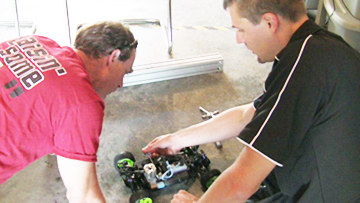Teachers learn about cutting-edge engineering from KU faculty
Teachers from across Kansas are spending the summer with faculty and graduate students from the University of Kansas School of Engineering, getting firsthand experience in two cutting-edge fields of engineering.
Fifteen teachers are participating in two programs, known as Research Experience for Teachers, funded by grants from the National Science Foundation that help teachers obtain valuable skills and collect materials they can take back to the classroom to better educate their students.
Six fourth- and fifth-grade teachers are in the second year of an initiative known as BET 4 Teachers, sponsored by KU’s bioengineering program. This group works with KU graduate students on six projects that have an emphasis on materials for the body or demonstrating the body as a machine. Teachers then develop unique lesson plans to take back to their classrooms to provide students with a targeted, hands-on learning experience.
The program also aims to breakdown two key barriers to engineering education, according to Lisa Friis, associate professor of mechanical engineering and director of the BET 4 Teachers program.
“We’re specifically asking these teachers to use the word ‘engineer.’ We found teachers were intimated by that word, and it projected onto their students, so they were scared of it, too,” Friis said. “We’re asking teachers to use interactive teaching methods where the students pretend to be an engineer, so they can see themselves as an engineer and the positive outcomes that engineering has on the world. We’re working really hard to overcome that negative perception.”
The program also strives to keep girls and minority students interested in science and math beyond fourth grade. Friis said data shows high interest in those subjects among all students in those grades, but by eighth grade, interest from girls and minority drops by half. Although engineering is traditionally a male-dominated field, that’s not the case for bioengineering, Friis said. Forty-four percent of the profession is female, and this program looks to capitalize on that.
“If we can introduce basic science and engineering concepts — and the word ‘engineering’ — in a field known to attract females, then it might retain the interest of those girls in fourth and fifth grade to where they can then see themselves in a positive light as an engineer,” Friis said. “Our goal is to help motivate girls and minorities that they can see themselves in this role.”
The other Research Experience for Teachers program involves nine high school and community college teachers and is known as the SHIFT program — Shaping Inquiry from Feedstock to Tailpipe. The teachers are split into four groups that focus on one aspect of production and use of biofuels. The program is sponsored by KU’s Center for Environmentally Beneficial Catalysis and KU’s Transportation Research Institute and is in its first year of NSF funding.

This six-week program engages teachers from different fields in key areas of generating biofuels, such as algae production, which involves biology teachers, to fuel performance, which involves physics teachers. It’s designed to show the educators that all fields of engineering are related and collaboration is key to success, said Claudia Bode, education director for the Center for Environmentally Beneficial Catalysis and a leader of the SHIFT program.
“The hope is to help students see the connection between different research disciplines, so that students are not just looking at biofuel production by itself. They need to see the bigger picture,” Bode said. “The teachers will connect the research they do at KU to a lesson they can take back to their classes to help students understand how important that collaboration is.”
Key components of the BET 4 Teachers and the SHIFT programs build on lessons learned from previous participants and spread best practices to the new crop of educators each year — all while sharpening the skills of KU faculty and graduate students.
“We’re hoping that we’ll have more and more broad impact throughout the educational system, learning how to communicate better and spread the best ideas,” Bode said.
Both programs are run in collaboration with the Southeast Kansas Education Service Center-Greenbush, which has strong ties to K-12 education throughout the state.